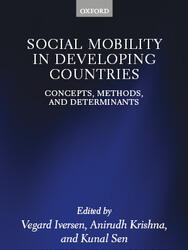Book Chapter
Rethinking occupational mobility in developing countries
Conceptual issues and empirical findings
This chapter discusses current methods for measuring and analysing occupational mobility, and the way in which methods designed for the analysis of industrial countries may need to be modified when applied in other contexts.
The chapter discusses particular features of some developing countries, such as their large and complex agricultural and informal sectors, and the problem of ‘equivalence of meaning’, which arises when stratification systems involve rather different institutional arrangements, for example with respect to land tenure.
The chapter concludes with a discussion of absolute and relative mobility in Chile, China, Egypt, and India, bringing out both the similarities and the differences between these countries in their absolute and relative rates of mobility and intersectionality with gender.
 Join the network
Join the network